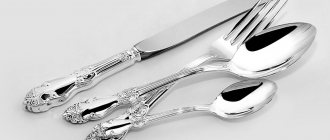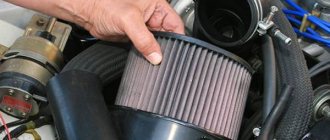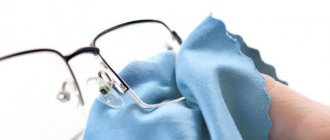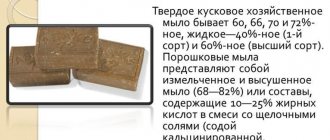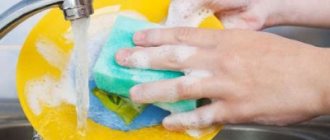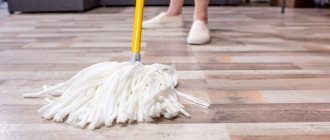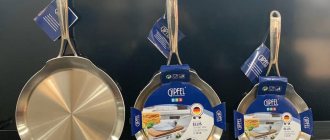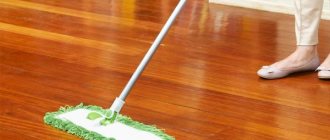Since ancient times, cupronickel silverware has been a special decoration item for any holiday. The name “cupronickel silver” comes from France, since this alloy was invented by two French academicians Mayo and Charrier. In appearance it is similar to silver items, but the price for such dishes is several times lower. Cupronickel tableware contains a copper-nickel alloy. This composition made it durable, beautiful and easy to clean. Very often people ask questions, how exactly to clean such products? Can nickel silver items be washed in the dishwasher? What products should I use to wash them? To answer them, let’s consider the advantages and disadvantages of cupronickel tableware.
Cupronickel: features
Cupronickel is one of the most beautiful materials for cutlery; it is an alloy of copper and white nickel. Cupronickel is valued for its similarity to silver, for its lower cost and higher strength. Cupronickel silverware is often very elegant and rare.
Why shouldn't cupronickel be washed in the dishwasher? It reacts with other metals and darkens easily. Also, for owners of such cutlery, the question often arises of how to clean nickel silver, since not all standard detergents for cutlery are suitable for caring for this alloy.
Preventing tarnishing of silver spoons
It is impossible to completely avoid silver tarnishing, but it is important to slow down the process and also know how to clean silver spoons at home. To prevent tarnishing of silverware, you should use the following measures:
- Avoid metal contact with sulfur-containing products;
- Clean silver forks and spoons as they become dirty;
- Do not expose the product to prolonged exposure to water;
- Properly store silver items.
Silver items must be stored correctly.
How to wash
What can happen to cupronickel in the dishwasher:
- The alloy will darken.
- The drawing will be erased or faded.
- The coating will be damaged, especially the gold plating.
- There is an opinion that the nickel silver coating reacts with dishwasher tablets, which is why an unpleasant oxide film is formed on the surface, which is hazardous to health.
Advice from Miss Clean magazine To preserve the design on cupronickel silverware, use special jewelry pastes a couple of times a month.
How to properly wash cupronickel:
- Do not use harsh chemicals.
- Abrasives and iron brushes are not suitable for metal.
- If dirt has adhered to a cupronickel item, soak it in warm water for 10 minutes, no more. You can add a little baking soda to the solution - this is the safest cleaning agent in the popular arsenal.
- It is not recommended to soak cupronickel for a long time, nor is it recommended to create a situation where soaking becomes necessary.
- Wash such dishes only with a soft sponge.
- Never use chlorine-containing products to remove plaque.
Cupronickel can also darken from dampness - always wipe the dishes dry.
If you nevertheless made a mistake in care, and the cupronickel has darkened, it’s time to try to save it. How to remove blackness, folk tricks:
- Wipe the dishes with a rag soaked in an alcohol solution.
- Briefly soak the utensils in ammonia, then rinse and dry.
- Dissolve 1 tbsp in a glass of warm water. l. vinegar, soak a soft cloth in the solution and rub the cupronickel.
- Soft polishing with a soda solution is acceptable.
- Take the shells of two eggs and a liter of water, bring everything to a boil and place the dishes there for a couple of minutes.
- To shine, rub cleaned cupronickel utensils with raw potatoes.
Appreciate your cupronickel: such devices create a feeling of celebration. With proper care, the dishes will delight owners and guests for many years without losing their presentability.
Source
Information about dishes that the housewife should not wash in the dishwasher
What woman wouldn't be happy with kitchen appliances? Especially if it's a dishwasher. But you need to know exactly which dishes cannot be washed in the dishwasher. Otherwise, instead of joy, the acquisition may bring severe grief. And it will not be her fault, but the inattention of the hostess.
Cleaning metal appliances
A dishwasher is a very useful purchase. This device saves a huge amount of water. And oddly enough, you can also save electricity. This is the case if hot water flows from an electric boiler in your kitchen.
However, even with such a wonderful household appliance as a dishwasher, hand washing is still not canceled.
There are quite large kitchen utensils that are difficult to position in the car so that they do not interfere with the rotation of the water sprinklers. After all, it is impractical to wash only 1-2 pots or pans. Unless the housewife saves her manicure.
When you are going to wash an item in the dishwasher, pay attention to whether there is an inscription on it that it can be washed in this way.
In the instructions for any machine there is a special section “What cannot be washed in the dishwasher.” It clearly states that aluminum objects are absolutely not suitable for such washing. Due to washing with special detergents used in dishwashers, aluminum becomes covered with unsightly dark gray spots.
You should not wash frying pans or pots with Teflon coating - it will quickly become covered with microscopic cracks under the influence of the detergent, and food will burn to the walls and bottom.
Cast iron, copper or tin utensils are also unsuitable for washing in this household appliance.
It is also better to wash kitchen knives (not table knives) by hand. After all, washing products and high drying temperatures will quickly dull them. It would be a great pity to have expensive knives made of high-quality steel.
Silver and cupronickel cutlery will also quickly lose their shine and become covered with dark spots. Therefore, it is better to wash them by hand. True, if cupronickel spoons and forks are used daily, you can wash them in the dishwasher. And then brush them once a week with tooth powder or toothpaste.
If the cutlery has wooden varnished handles, then after the first wash in the machine the varnish will crack and begin to peel off. So it's better to wash them by hand.
But you don’t have to regret wooden spatulas, which are cheap. They wash well and don't deteriorate that much.
Which glass and crystal is not suitable
Glassware and ordinary crystal glasses and glasses, washed in a machine, will sparkle and shine with cleanliness. But if it is thin, valuable crystal (baccarat), then under no circumstances wash it, much less dry it in the car. Hot air will quickly fade and crack crystal products.
In addition, items made of Czech or Yugoslav decorative glass with colored patterns are not suitable for washing in the dishwasher. If you wash decorative glass produced in Gus-Khrustalny several times in this way, the glasses, goblets and shot glasses will lose their appearance. After all, the drawing is applied on them in a special way. After washing, only white matte spots will remain from such an image.
Fine porcelain, if it is dear to you, also cannot be washed mechanically.
This equally applies to earthenware ware. Cracks and then chips will quickly appear on the clay surface.
Any antique products should not be in danger of being damaged. After all, at the time when they were made, there were no dishwashers yet. So they were not designed for this type of washing.
After purchasing a kitchen aid, you should only buy dishes that are suitable for mechanical washing.
Unconventional items that go in the dishwasher
Some overly “advanced” owners of this household kitchen appliance boast that they washed gardening tools, plastic slippers, combs, massage brushes, baseball caps, sneakers and even (!) rubber boots in it.
But all this is not intended to be washed in this way. The manufacturer of household appliances directly states in the operating instructions that dishes that contain glue cannot be washed in the unit; plastic products that cannot withstand high temperatures; iron objects not covered with a stainless layer.
In addition, items contaminated with paint, ash, lubricants, tar or bitumen should not be placed there. You should also not wash items that are completely saturated with water, such as towels, sponges and baseball caps.
Can cupronickel be washed in the dishwasher?
Owners of cupronickel tableware and cutlery can be said to be lucky, because among such products there are real rarities. You eat something with a cupronickel spoon and don’t know that it can cost a fortune. It’s all the more offensive if such a spoon or bowl is hopelessly damaged due to improper care. We will try to prevent this and first discuss the question of whether cupronickel can be washed in the dishwasher? Can a dishwasher even ruin a cupronickel item, or is this just idle speculation, let’s find out.
Conclusion
A dishwasher is an indispensable assistant in a modern kitchen, but its use is not always advisable. For example, fragile and delicate crystal can be hopelessly damaged if loaded with ordinary cutlery.
But in some cases, washing crystal products in a machine is still allowed if the unit has a “delicate mode” function and provides for the use of cold or warm water throughout the entire cycle.
The video in this article will allow you to visually familiarize yourself with the intricacies of cleaning stains on crystal glassware. If you have any questions, I will be happy to answer them in the comments!
What will happen?
Cupronickel alloy is one of the most resistant. This fact is known to many and this has also given rise to the erroneous statement that cupronickel dishes and cutlery are not afraid of any harsh washing conditions. Meanwhile, washing dishes made from this copper-nickel alloy in the dishwasher is strictly prohibited and for good reason. Of course, under the influence of chemistry and hot water, cupronickel will not collapse, but something will happen to the products that the owner will absolutely not like.
- Cupronickel silverware and cutlery will darken greatly.
- Any coating on objects made of such an alloy will suffer very quickly.
- The design on nickel silver objects will, at best, become more faded, and at worst, will be partially erased.
It is clear that no one would want to use cupronickel dishes blackened in this way.
It is also believed that the coating on nickel silver products reacts with the tablets and powder that are commonly used in the dishwasher. As a result, an oxide film forms on the surface of the product, which makes the dishes not only unsightly, but even hazardous to health. If you value your nickel silver cutlery and crockery, take care of it properly and don't mindlessly shove it into the dishwasher.
Types and causes of silverware contamination
The main types of contamination of silverware:
- biological (fat, acid in food);
- natural (hard water sediment, kitchen smoke during cooking);
- chemical (household chemicals for washing dishes).
According to GOST R 51152-98, tableware is made of 800 sterling silver. If the devices were purchased at an oriental bazaar, you will have to forget about a high-quality ligature. In this case, the cause of darkening and stains on the surface of silverware is metal oxides in the alloy.
Deterioration in appearance can also be caused by improper care (cleaning, sharpening of devices).
Knives and tools with sharp edges
Sharp objects are contraindicated in the dishwasher. Firstly, you can forget or simply not know about cutting objects, if you were not the one who put the dirty dishes, and get seriously injured.
Secondly, such washing can ruin good appliances. Strong detergents, when used frequently, will dull the sharp edges of expensive knives over time. This is especially true for ordinary housewives who are not often puzzled by sharpening. Knife handles can be damaged in the dishwasher, and carbon steel blades can rust over time.
Thirdly, carelessly placed knives can simply damage the parts of the dishwasher, which will lead to breakdown.
All this, of course, does not apply to ordinary table knives, but their steel inevitably becomes dull over time due to frequent washing.
Can nickel silver items be washed in the dishwasher?
Since ancient times, cupronickel silverware has been a special decoration item for any holiday. The name “cupronickel silver” comes from France, since this alloy was invented by two French academicians Mayo and Charrier. In appearance it is similar to silver items, but the price for such dishes is several times lower. Cupronickel tableware contains a copper-nickel alloy. This composition made it durable, beautiful and easy to clean. Very often people ask questions, how exactly to clean such products? Can nickel silver items be washed in the dishwasher? What products should I use to wash them? To answer them, let’s consider the advantages and disadvantages of cupronickel tableware.
Advantages and disadvantages of cupronickel tableware
Cupronickel silverware has the following advantages:
- Due to its composition, it benefits human health. Nickel, acting on the pancreas, can lower blood sugar levels. Copper has an antibacterial effect. It was also found that if you leave water with cupronickel cutlery, it is useful to wash your face with such a liquid.
- It is wear resistant. Due to the metal connections, the products have significant weight, which means they are difficult to damage or break.
- Items made of cupronickel heat up rather slowly, so they are convenient in everyday life.
- Durability. Due to the combination of metals, this material can remain like new for several decades.
- Aesthetic side. Products made from cupronickel have always been used on special occasions, as they look very expensive and beautiful.
Results
So, what can and cannot be done with cupronickel cutlery:
- Water and soda can be replaced with potato broth, which is poured onto foil with spoons.
- Wipe stains on appliances with a cloth previously soaked in warm vinegar, and then rinse under water.
- To simply freshen your appliances, wash them in soapy water. To do this, take 50 grams of soap per liter of water.
- Cupronickel silver devices are stored in cling film without access to air. This way they retain their appearance longer.
- If the contamination is minor, it will be enough to wipe the cupronickel devices with a rag soaked in alcohol or vodka.
- These items should not be washed in the dishwasher.
- Do not use substances containing chlorine when cleaning.
- You can use special jewelry cleaning products.
- Remember, cupronickel devices should be wiped dry.
Article on the topic: Where is the air conditioner in Lanos
